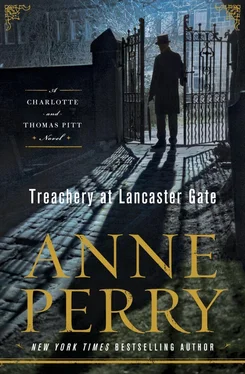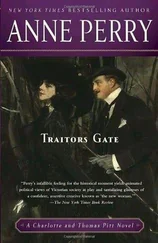Anne Perry - Treachery at Lancaster Gate
Здесь есть возможность читать онлайн «Anne Perry - Treachery at Lancaster Gate» весь текст электронной книги совершенно бесплатно (целиком полную версию без сокращений). В некоторых случаях можно слушать аудио, скачать через торрент в формате fb2 и присутствует краткое содержание. Год выпуска: 2016, Издательство: Random House Publishing Group, Жанр: Исторические приключения, на английском языке. Описание произведения, (предисловие) а так же отзывы посетителей доступны на портале библиотеки ЛибКат.
- Название:Treachery at Lancaster Gate
- Автор:
- Издательство:Random House Publishing Group
- Жанр:
- Год:2016
- ISBN:нет данных
- Рейтинг книги:4 / 5. Голосов: 1
-
Избранное:Добавить в избранное
- Отзывы:
-
Ваша оценка:
- 80
- 1
- 2
- 3
- 4
- 5
Treachery at Lancaster Gate: краткое содержание, описание и аннотация
Предлагаем к чтению аннотацию, описание, краткое содержание или предисловие (зависит от того, что написал сам автор книги «Treachery at Lancaster Gate»). Если вы не нашли необходимую информацию о книге — напишите в комментариях, мы постараемся отыскать её.
Treachery at Lancaster Gate — читать онлайн бесплатно полную книгу (весь текст) целиком
Ниже представлен текст книги, разбитый по страницам. Система сохранения места последней прочитанной страницы, позволяет с удобством читать онлайн бесплатно книгу «Treachery at Lancaster Gate», без необходимости каждый раз заново искать на чём Вы остановились. Поставьте закладку, и сможете в любой момент перейти на страницу, на которой закончили чтение.
Интервал:
Закладка:
“He hates the police?” Pitt sat back, surprised by this new information. “Does he have sympathy with anarchist connections?” It was not unusual for young men of wealth and privilege to have sympathies with the poor, and aspirations to see the politics changed. They saw it as a just cause on whose behalf to rebel.
“No,” Isadora said simply. “A dear friend of his was convicted and hanged a couple of years ago. Alexander did everything he could to save his friend, certain that he was innocent. He failed, and Dylan Lezant went to the gallows. Alexander never really got over it. He believes that a large proportion of the police are deeply corrupt, and they are being shielded by other police for reasons of their own.”
“Do you believe him?” he asked.
She had not expected anything quite so direct. It was clear from the sudden widening of her eyes.
“I believe it is what he thinks,” she answered slowly.
Pitt remembered the Lezant case. He recalled with another chill that that, too, was to do with a drug arrest that had gone wrong. Lezant had been arrested after he shot a totally innocent man who merely happened to be passing.
“I recall the case.” Pitt nodded. “Tragic. Lezant was also addicted, wasn’t he?”
“Yes, but as I said, Alexander was still certain that he was innocent.”
“So who shot the bystander?”
She shook her head very slightly. “Alexander believed Lezant’s story that it was the police themselves.”
Pitt was startled.
“Why would they do that, for heaven’s sake?”
“Carelessness…panic,” she said. “But then they had to blame someone else, because they shouldn’t have had guns with them anyway. I know what you think: He was a young man who was devoted to his friend, perhaps the one person who understood his addiction and did not blame him. He believed what he had to, to preserve his own emotional values and possibly even to justify the battle he put up to save Lezant from the rope-and failed. Who knows all the reasons why we do things?”
He could not argue with her. “So you think Alexander could have placed the bomb that blew up the Lancaster Gate house, killing two policemen and critically injuring three more? Is that not…extreme?”
“Yes, it is,” she agreed. “And I very much hope that I am totally mistaken. Believe me, I debated long and deeply whether I should even mention it to you. It seems disloyal to my friend. Maybe it is worse than that. I am not certain John would approve. I suppose that is obvious, since I have not told him.” Now her face was pinched with a painful memory. “But I know that people you have loved, that you have known all your life, can be quite different from what you have supposed. Why would you even entertain the idea that they are really strangers to you, full of passions that you did not dream of?”
He knew now that she was speaking of her brother, who would have been willing to see her blamed for a crime she had not committed. She would never know if he would even have seen her hanged for it without speaking out to save her with the truth.
The shadow of that time was there in the room. What did she recall of it now? It had been years ago and it had been Pitt who had saved her. It was also Pitt who had caused the downfall of her brother, and his death, in another case after that. So much old pain. And yet Isadora had come to him now with this, not choosing to look aside, not even choosing to confide in Cornwallis, the husband she loved so deeply, because he had once been assistant commissioner of the very police they were speaking of.
Was that because she trusted Pitt to face the truth, whatever the cost?
“I’ll speak to Mr. Duncannon tomorrow,” he promised. “Where can I find him?”
She had wanted him to say just this; it was the reason she had come. And yet now she also looked stricken. The die was cast. It was too late to change her mind.
With stiff fingers she opened her reticule and passed him a small piece of paper. On it was written the address of the flat in which Alexander Duncannon lived. He was of the social class and income that did not necessitate any occupation, except whatever he chose with which to pass his time.
“When might I find him there?” he asked.
“I would try about ten o’clock in the morning,” she answered. “I don’t imagine he will be an early riser. Later, and he might have gone out. He has friends.”
“Thank you. I certainly will not mention your name when I talk to him,” Pitt promised.
She hesitated for a moment, at a loss for words herself. Then she gave a brief smile and allowed him to escort her to the door and the street, where her carriage was waiting.
Pitt found Alexander Duncannon not at his flat but at an art exhibition three blocks away from the Autonomy Club. The man at the door told him who he was. Apparently he came often. A dark, slender young man. He looked about twenty-five. He was standing alone in front of a large painting of a country scene. Laborers stood with scythes in hand. The August sun shone out of a clear blue sky onto the golden cornfield. A few scarlet poppies burned bright at the margins.
Pitt had grown up in the country. This looked idyllic, and quite unreal to him. It had a kind of beauty, but it was set back from the smell of the earth, the relentless heat of harvesttime, the ache of backs too long bent.
“Do you like it?” he asked.
The softness of Alexander’s youth was in his cheeks when he turned, but there were hard shadows around his eyes. He was clearly familiar with pain. He smiled, suddenly and charmingly. It lit his face. “No,” he said with candor. “Do you? Or have you not looked at it long enough?”
Pitt smiled back. “How long do I need to look at it in order to like it?” he asked.
Alexander was amused. “I don’t know, but longer than I have. What do you not like about it? It’s pretty enough…isn’t it?”
Pitt decided in that moment to engage him in an honest conversation. “Is that what you think it should be, pretty?” he asked.
“You don’t like pretty pictures?” He took him up on the challenge instantly and-from the grace of his posture and the sudden life in his eyes-with pleasure.
Pitt gave it consideration. “No, I think I don’t. At least not if it is at the expense of the real. Artifice has its own kind of ugliness.”
Now Alexander was eager, his eyes alight.
“Do you know the place?”
“Not recognizably.”
Alexander laughed. “Touche,” he said cheerfully. “But are you familiar with what it is meant to be? What it was, before it was sentimentalized?”
“Many like it, yes,” Pitt admitted, for a moment caught back in a memory so sharp it was almost physical.
“Funny. I don’t.” Alexander shrugged. “And yet I know it’s wrong. Perhaps anyone can develop a distaste for the artificial, don’t you think?”
“Yes, I agree.” Long ago, before graduating to murder cases, Pitt had dealt with theft, especially of fine art. He had learned a lot more about it than he had expected to, and found it gave him great pleasure. He need not tell this young man who he was, not just yet. Special Branch was not police. No such disclosure was required. “It is an emotional lie,” he added.
Now he had Alexander’s complete attention. “How perceptive of you, Mr….?”
“Pitt.” There was no escaping giving his name without just the kind of dishonesty he had spoken of. “Thomas Pitt.”
“Alexander Duncannon.” He held out his hand.
Pitt shook it. “There has to be something better here, surely?” he asked. “What do you like?”
“Ah! Let me show you something lovely,” Alexander responded. “It’s very small, but quite beautiful.” He turned away and began walking rather unevenly toward the next room.
Читать дальшеИнтервал:
Закладка:
Похожие книги на «Treachery at Lancaster Gate»
Представляем Вашему вниманию похожие книги на «Treachery at Lancaster Gate» списком для выбора. Мы отобрали схожую по названию и смыслу литературу в надежде предоставить читателям больше вариантов отыскать новые, интересные, ещё непрочитанные произведения.
Обсуждение, отзывы о книге «Treachery at Lancaster Gate» и просто собственные мнения читателей. Оставьте ваши комментарии, напишите, что Вы думаете о произведении, его смысле или главных героях. Укажите что конкретно понравилось, а что нет, и почему Вы так считаете.












